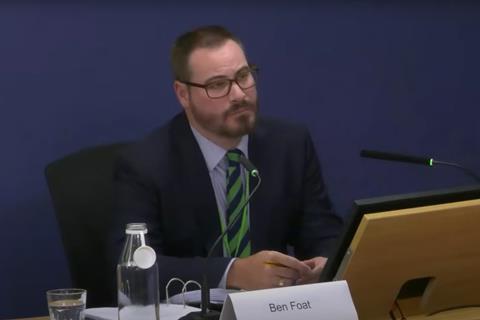
When the Post Office Inquiry featured a phalanx of lawyers in the first half of this year, it might have been assumed that was the limit of the legal profession’s interest in proceedings.
But a series of revelations from the seventh and final phase of the inquiry – due to end next month – has thrown light on the culture and conduct of the legal team working for the Post Office today.
Consequently, general counsel Ben Foat’s appearance at the inquiry on Friday (extended to an unusually early 9am start) has taken on greater significance. Here are the five key questions he will be likely to face:
1) Do lawyers still believe most sub-postmasters were guilty?
Former Post Office chair Henry Staunton suggested there remains ‘lingering distrust’ of postmasters still working for the organisation – a scepticism which included the lawyers. Staunton told the inquiry the ‘widespread view internally’ at the Post Office was that those who had not come forward to appeal were guilty, and that most of the convictions should still stand. Is that view prevalent among the legal team, and has that affected decision-making?
2) Is the compensation process too confrontational?
An internal report from January 2023 reported that one former postmaster felt lawyers had ‘demonstrated brutality’ in negotiations. Staunton himself felt that in-house and external lawyers had made issues ‘overly adversarial’. The external costs of legal advice for work on the compensation reached almost £24m in a year – does this suggest that lawyers are fighting claims unnecessarily?
3) Have lawyers put up unmanageable hurdles for claimants?
Related to the second question is whether there has been a strategy from the outset to make life difficult for those claiming compensation and even drive them away. Foat and his colleague Rodric Williams were both emailed in 2020 by portfolio manager Mark Underwood, who expressed reservations about charging fees for making claims. Instead, it was mooted, the Post Office could ‘achieve the same desired outcome’ through a ‘very tight and clearly communicated set of eligibility criteria'. Have lawyers actually conspired to make claims virtually impossible to make in the first place?
4) Are people still being prosecuted based on Horizon data?
Much of the latest phase of the inquiry has focused on Foat's reported approval of a plan last year to send auditors unannounced into a branch where a shortfall was discovered. Staunton said that given the history of unduly harsh investigations the handling of this matter ‘showed a real lack of judgement’. After everything that has come out in the past 20 years about the reliance on Horizon data and aggressive approach of investigators, could it really be that the same mistakes are still being made?
5) Is the role of Post Office GC an impossible job?
Foat is clearly not responsible for the historic scandals that have dogged the Post Office and which his predecessors have summarily failed to prevent. But just like those who fulfilled the role previously, he has been subject to apparently undermining treatment from executives. Staunton wrote about Foat in an email to the chief executive Nick Read in December 2023 that ‘I have never had a legal counsel in whose judgement I have so little faith’. Read himself accidentally disclosed to Foat an email which was highly derogatory about the general counsel. Foat himself took time away during the summer and the question may be asked: why would anyone want this job?



































